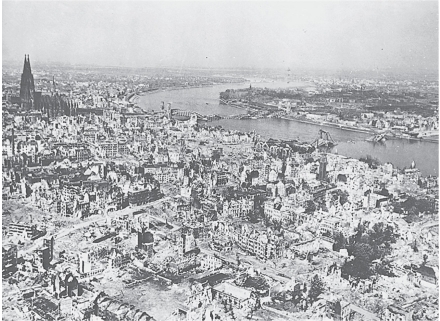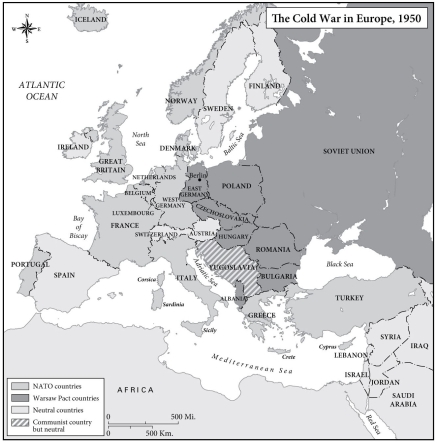Deck 3: Truman and the Cold War
Question
Question
Question
Question
Question
Question
Question
Question
Question
Question
Question
Question
Question
Question
Question
Question
Question
Question
Question
Question

Unlock Deck
Sign up to unlock the cards in this deck!
Unlock Deck
Unlock Deck
1/20
Play
Full screen (f)
Deck 3: Truman and the Cold War
1
Upon becoming president, Truman's biggest weakness was in
A) Monetary policy
B) Diplomacy
C) Foreign policy
D) Military knowledge
A) Monetary policy
B) Diplomacy
C) Foreign policy
D) Military knowledge
C
2
Unlike Roosevelt, Truman's advisors felt that the US and the USSR
A) Had irreconcilable differences
B) Had similar goals
C) Could be long-term allies
D) Had the same values
A) Had irreconcilable differences
B) Had similar goals
C) Could be long-term allies
D) Had the same values
A
3
In his first meeting with Soviet foreign minister Molotov, Truman felt he should get _______ of what the US wanted from the Soviets.
A) 10%
B) 50%
C) 65%
D) 85%
A) 10%
B) 50%
C) 65%
D) 85%
D
4
Truman saw the atomic bomb as
A) A lever of influence in postwar relations
B) The weapon that would end the war
C) A weapon that could save American lives
D) All of the above
A) A lever of influence in postwar relations
B) The weapon that would end the war
C) A weapon that could save American lives
D) All of the above

Unlock Deck
Unlock for access to all 20 flashcards in this deck.
Unlock Deck
k this deck
5
Those who support US use of the atomic bomb tend to argue
A) That any weapon should be used
B) That it saved both American and Japanese lives
C) That it frightened the Soviets from challenging the US
D) All of the above
A) That any weapon should be used
B) That it saved both American and Japanese lives
C) That it frightened the Soviets from challenging the US
D) All of the above

Unlock Deck
Unlock for access to all 20 flashcards in this deck.
Unlock Deck
k this deck
6
Those who do not support US use of the atomic bomb argue that
A) Japan would have surrendered anyway
B) No one should use such a terrible weapon
C) It helped cause the Cold War by preventing the Soviets from getting involved in the war with Japan
D) All of the above
A) Japan would have surrendered anyway
B) No one should use such a terrible weapon
C) It helped cause the Cold War by preventing the Soviets from getting involved in the war with Japan
D) All of the above

Unlock Deck
Unlock for access to all 20 flashcards in this deck.
Unlock Deck
k this deck
7
Truman's first meeting with Stalin was at
A) Yalta
B) San Francisco
C) Potsdam
D) Tehran
A) Yalta
B) San Francisco
C) Potsdam
D) Tehran

Unlock Deck
Unlock for access to all 20 flashcards in this deck.
Unlock Deck
k this deck
8
The major conflict resolved at the Potsdam Conference was
A) The issue of reparation amounts
B) Control of Germany
C) Free elections in Eastern Europe
D) No major conflicts were solved at Potsdam
A) The issue of reparation amounts
B) Control of Germany
C) Free elections in Eastern Europe
D) No major conflicts were solved at Potsdam

Unlock Deck
Unlock for access to all 20 flashcards in this deck.
Unlock Deck
k this deck
9
The first potential armed conflict between Soviet and US troops threatened over Soviet occupation of
A) Berlin
B) Poland
C) Bulgaria
D) Azerbaijan
A) Berlin
B) Poland
C) Bulgaria
D) Azerbaijan

Unlock Deck
Unlock for access to all 20 flashcards in this deck.
Unlock Deck
k this deck
10
The Soviets refused to join an international body for the control of atomic energy because
A) It left the US with an atomic monopoly until the final stage of the agreement
B) The Soviets would have no veto power over inspections or sanctions
C) The US would control the majority of votes within the body responsible for developing peaceful uses of atomic energy
D) All of the above
A) It left the US with an atomic monopoly until the final stage of the agreement
B) The Soviets would have no veto power over inspections or sanctions
C) The US would control the majority of votes within the body responsible for developing peaceful uses of atomic energy
D) All of the above

Unlock Deck
Unlock for access to all 20 flashcards in this deck.
Unlock Deck
k this deck
11
When the British could no longer afford to send economic aid to Greece, the US stepped in
A) In an effort to beat back Communism in the Middle East
B) To spread freedom and democracy
C) To prevent totalitarianism from taking over Europe
D) In order to preserve political stability and ensure access to resources and markets for American goods
A) In an effort to beat back Communism in the Middle East
B) To spread freedom and democracy
C) To prevent totalitarianism from taking over Europe
D) In order to preserve political stability and ensure access to resources and markets for American goods

Unlock Deck
Unlock for access to all 20 flashcards in this deck.
Unlock Deck
k this deck
12
The Truman Doctrine committed the US to
A) Aid to countries that needed help maintaining political stability
B) Fighting Communism on moral grounds
C) Economic aid to US trade partners
D) Pursuing US self-interest over moral principles
A) Aid to countries that needed help maintaining political stability
B) Fighting Communism on moral grounds
C) Economic aid to US trade partners
D) Pursuing US self-interest over moral principles

Unlock Deck
Unlock for access to all 20 flashcards in this deck.
Unlock Deck
k this deck
13
The US plan to send massive economic support to rebuild Western Europe was called the
A) Marshall Plan
B) Truman Doctrine
C) Dawes Plan
D) North Atlantic Treaty
A) Marshall Plan
B) Truman Doctrine
C) Dawes Plan
D) North Atlantic Treaty

Unlock Deck
Unlock for access to all 20 flashcards in this deck.
Unlock Deck
k this deck
14

-This image shows the German city of Cologne in ruins as a result of
A) Trench warfare
B) Wartime bombing
C) Artillery bombardments
D) An atomic bomb attack

Unlock Deck
Unlock for access to all 20 flashcards in this deck.
Unlock Deck
k this deck
15

-Warsaw Pact countries are those allied with
A) The North Atlantic Treaty Organization
B) The United States
C) The Soviet Union
D) No one-those were the neutral countries

Unlock Deck
Unlock for access to all 20 flashcards in this deck.
Unlock Deck
k this deck
16
The Molotov Plan was the Soviet answer to
A) The Dawes Plan
B) The Marshall Plan
C) NATO
D) The Warsaw Pact
A) The Dawes Plan
B) The Marshall Plan
C) NATO
D) The Warsaw Pact

Unlock Deck
Unlock for access to all 20 flashcards in this deck.
Unlock Deck
k this deck
17
The first move the Soviets made in their attempt to impose total control over Eastern Europe was to
A) Purge left-wing leaders from Hungary
B) Send Soviet troops to back up a coup in Czechoslovakia
C) Blockade Berlin
D) Fund communist rebels in Greece
A) Purge left-wing leaders from Hungary
B) Send Soviet troops to back up a coup in Czechoslovakia
C) Blockade Berlin
D) Fund communist rebels in Greece

Unlock Deck
Unlock for access to all 20 flashcards in this deck.
Unlock Deck
k this deck
18
The version of the inevitability hypothesis for the Cold War that blames the Soviets for the conflict is based on the belief that
A) The Soviets were not interested in world affairs
B) Americans were committed to only acting morally and within their perceived values
C) The Soviets were committed to the spread of Communism worldwide
D) Soviet hatred of capitalism was too ingrained to permit compromise
A) The Soviets were not interested in world affairs
B) Americans were committed to only acting morally and within their perceived values
C) The Soviets were committed to the spread of Communism worldwide
D) Soviet hatred of capitalism was too ingrained to permit compromise

Unlock Deck
Unlock for access to all 20 flashcards in this deck.
Unlock Deck
k this deck
19
The version of the inevitability hypothesis that blames the US for the Cold War conflict says that
A) Americans were uninterested in world affairs
B) Americans were only interested in moral action on the surface, in reality they were liable to approve acting in their own self-interest
C) The endless demands of capitalism for new markets propelled the US into interventionism and imperialism
D) American hatred of communism was too ingrained to permit compromise
A) Americans were uninterested in world affairs
B) Americans were only interested in moral action on the surface, in reality they were liable to approve acting in their own self-interest
C) The endless demands of capitalism for new markets propelled the US into interventionism and imperialism
D) American hatred of communism was too ingrained to permit compromise

Unlock Deck
Unlock for access to all 20 flashcards in this deck.
Unlock Deck
k this deck
20
The book's author believes that the Cold War
A) Was inevitable, and it was the Soviets' fault
B) Was unnecessary, and the conflicts could have been handled better
C) Was inevitable, and was the Americans' fault
D) Was inevitable, but because the two systems were fundamentally in conflict
A) Was inevitable, and it was the Soviets' fault
B) Was unnecessary, and the conflicts could have been handled better
C) Was inevitable, and was the Americans' fault
D) Was inevitable, but because the two systems were fundamentally in conflict

Unlock Deck
Unlock for access to all 20 flashcards in this deck.
Unlock Deck
k this deck


